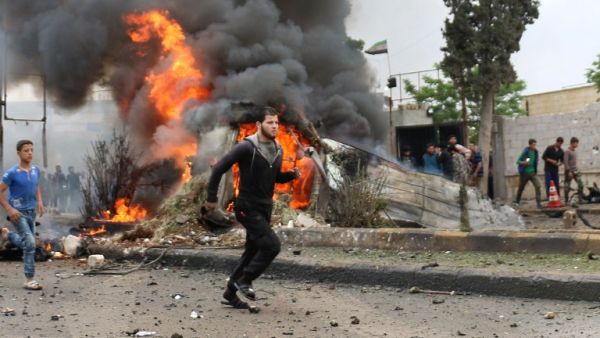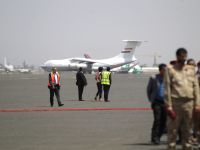A deal brokered by Russia, Turkey and Iran to set up safe zones for civilians in Syria went into effect at midnight (2100 GMT), a monitoring group has said.
"Shortly after midnight, calm prevailed in all areas which were mentioned in the agreement," Rami Abdel Rahman, head of the Syrian Observatory for Human Rights, told dpa.
However, half an hour after the deal went into effect, the Observatory and activists said a loud explosion rocked the Teir Malla area, north of Homs.
The Observatory did not give any details, but activists said a rocket was fired into the rebel-held area from Syrian regime posts.
The Britain-based group said that this is the first ceasefire in 2017, but the fourth ceasefire since 2016 in Syria.
Ahmed Ramadan, spokesman of the opposition's Syrian National Coalition, was sceptical.
He told dpa shortly after the agreement went into effect: "Previous agreements were violated, let us see if this holds."
According to the agreement, the "de-escalation areas shall be created with the aim to put a prompt end to violence, improve the humanitarian situation and create favourable conditions to advance political settlement of the conflict in the Syrian Arab Republic."
The deal envisions safe zones throughout the western half of Syria, in the "Idlib province and certain parts of the neighbouring provinces Latakia, Hama and Aleppo," as well as in the Homs, Daraa and Quneitra provinces and the Ghouta district in the area of Damascus.
Russia, Turkey and Iran will still be permitted to fight terrorist groups within the safe zones, according to a copy of the agreement obtained by dpa.
Activist Ibrahim al-Idlibi, who is based in Idlib, said the situation was calm in the province, which has been the target of daily raids by regime and Russian planes for the past few months.
The agreement says that the de-escalation areas and security zones are a temporary measure, that could be in place for six months. It could be automatically extended on the basis of a consensus between the agreeing parties.
The Syrian opposition's High Negotiations Committee has contested Iran's signing of the agreement, saying it is "an aggressor that should be held accountable for violations against Syrians."
Russia and Iran have been the main military backers of Syria's ruling regime, while Turkey has supported certain rebel groups seeking to overthrow Syrian President Bashar al-Assad.
"The United Nations, the United States and Saudi Arabia have welcomed the deal," Russian Deputy Defence Minister Alexander Fomin said in comments carried by state news agency TASS.
The US State Department said that it supports "any effort" that can genuinely move toward peace but voiced scepticism about the new agreement's ability to create safe zones.
Syria's ruling regime has supported the agreement, a senior Russian diplomat said, as the deal was announced this week.
As part of the deal, US-led coalition jets in Syria will not be allowed to fly over the zones, the head of Russia's delegation to the Syrian peace talks, Alexander Lavrentyev, said in comments carried Friday by state media.
Russia said soon after the deal was signed that it would do everything it could to ensure a prohibition of flights over those areas.
In Washington, Pentagon spokesman Jeff Davis said the US military has "not changed or altered our mission in any way."
"These de-escalation zones, as I have seen them on the map, are in Western Syria and not in areas where [the Islamic State group] is active," he said. "Our operations are focused on [Islamic State], which are farther east."
There have been many calls for no-fly zones in Syria. If implemented, they would be the first during the country's civil war, which is now in its seventh year.
Many previous ceasefire agreements in Syria have largely failed. The conflict is multi-sided, with Syria's ruling regime, which is widely accused of war crimes, battling a spectrum of belligerents ranging from the so-called moderate opposition to UN-designated terrorist groups, such as Islamic State.
That complexity, exacerbated by the myriad of external military powers intervening in the conflict, has severely hindered past attempts at peace.








